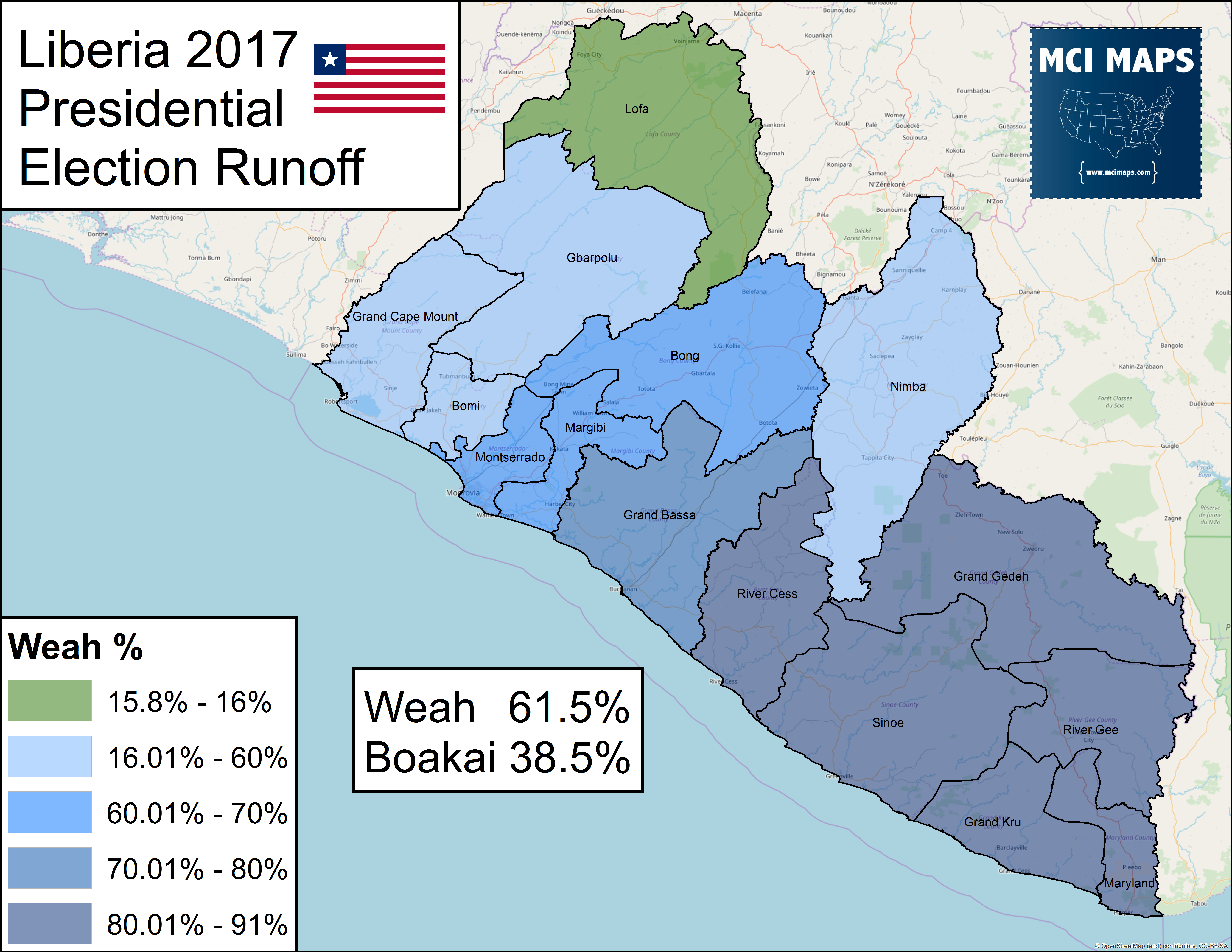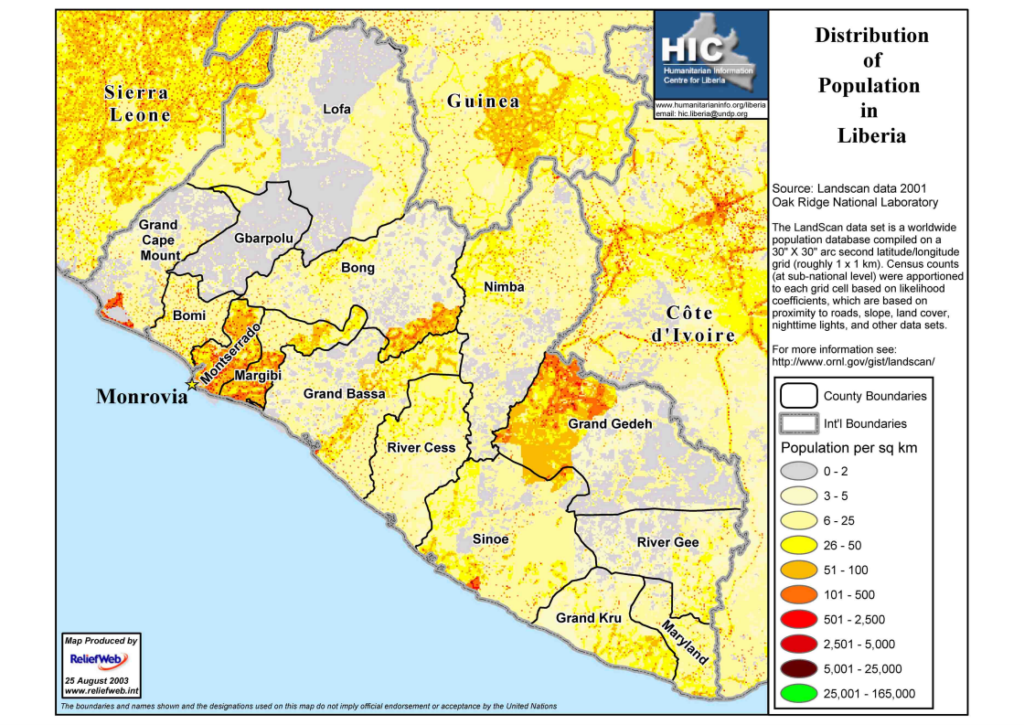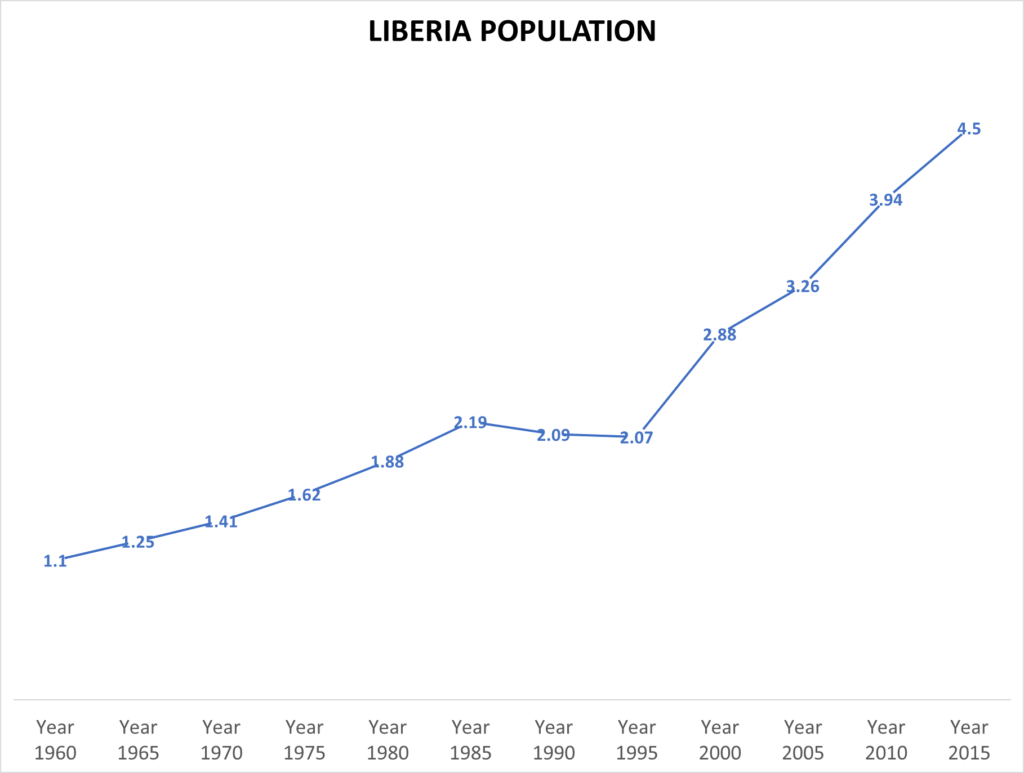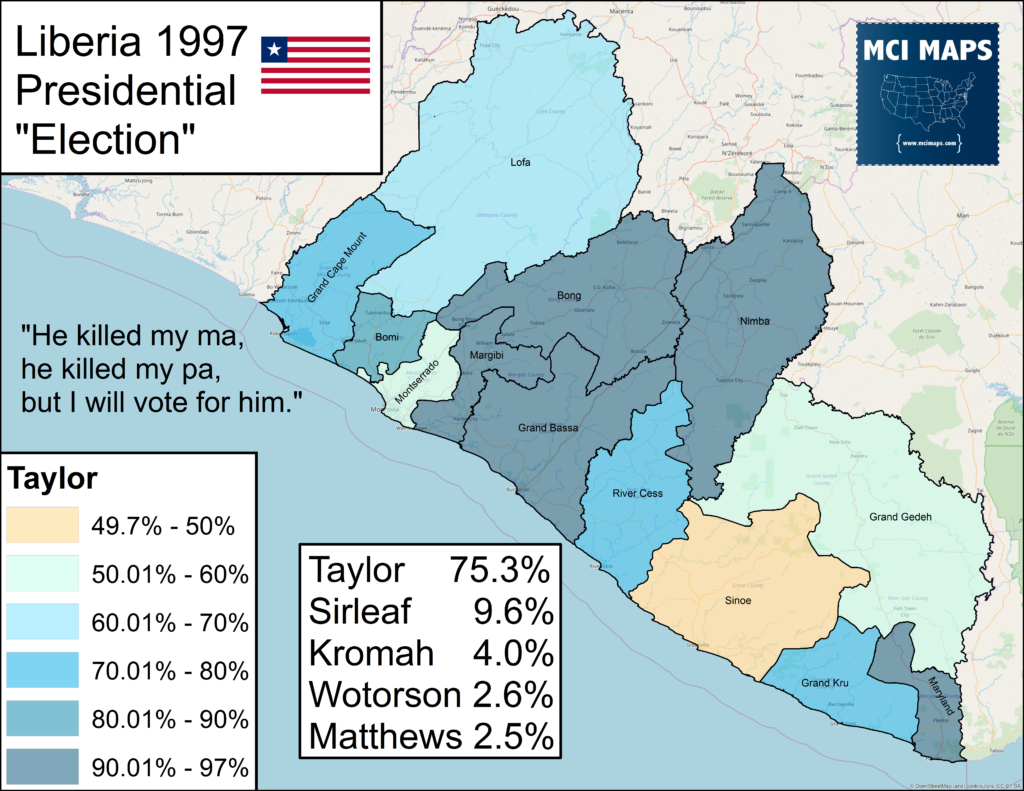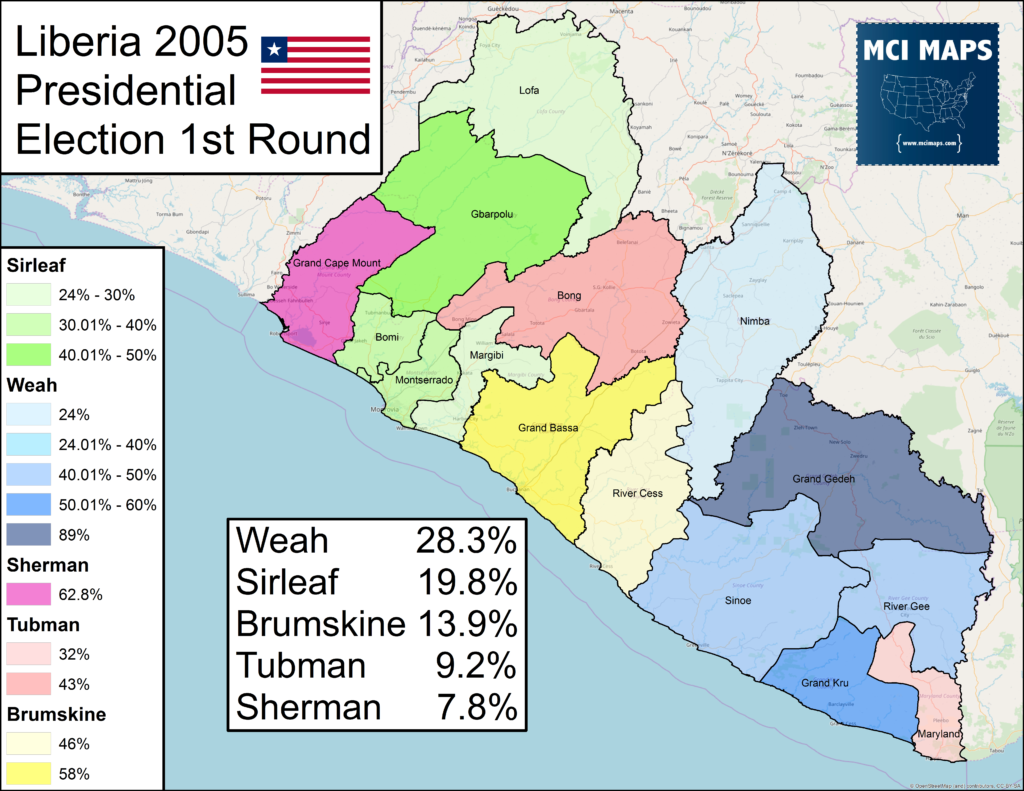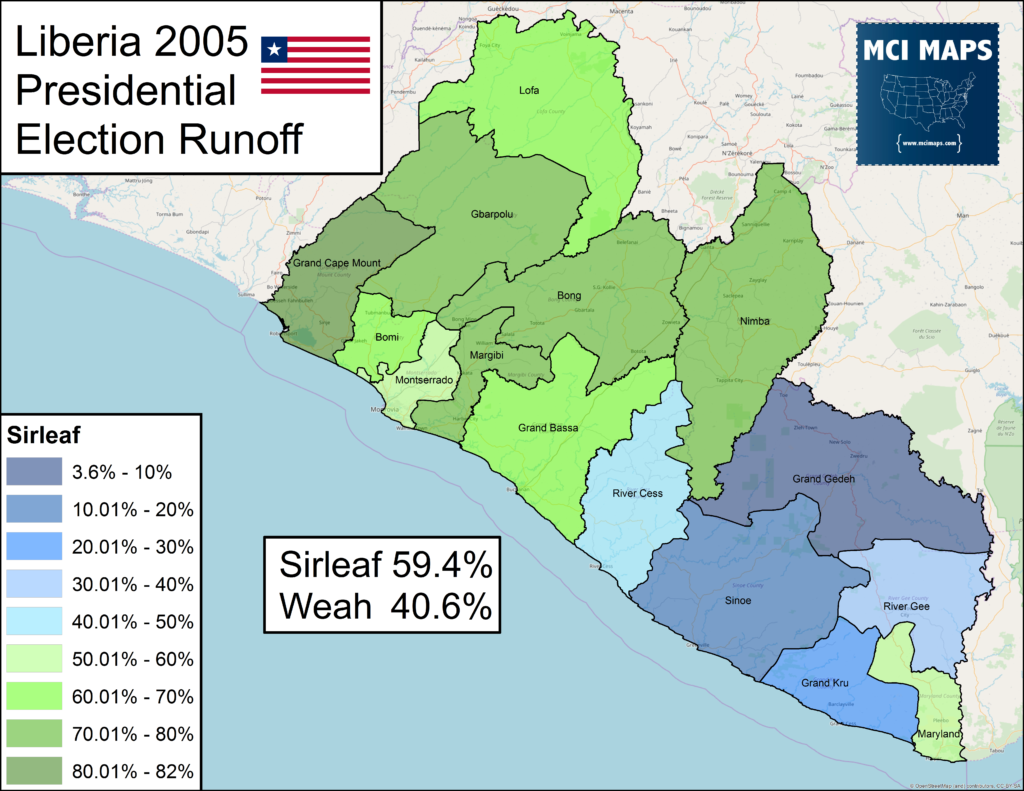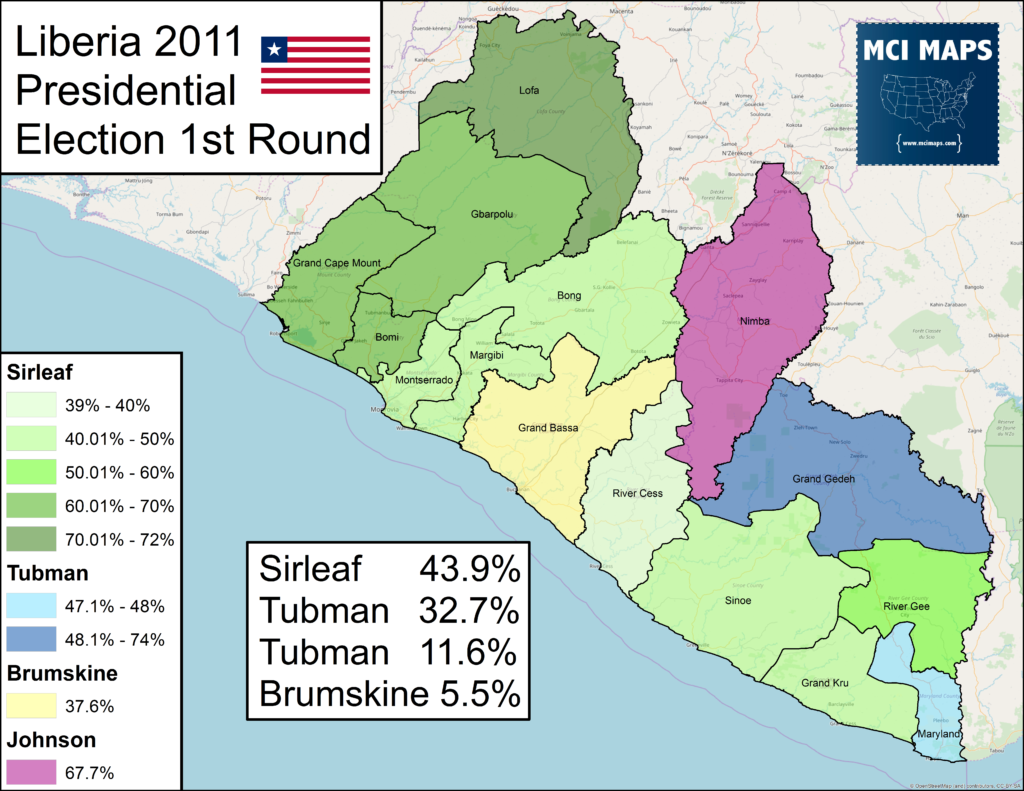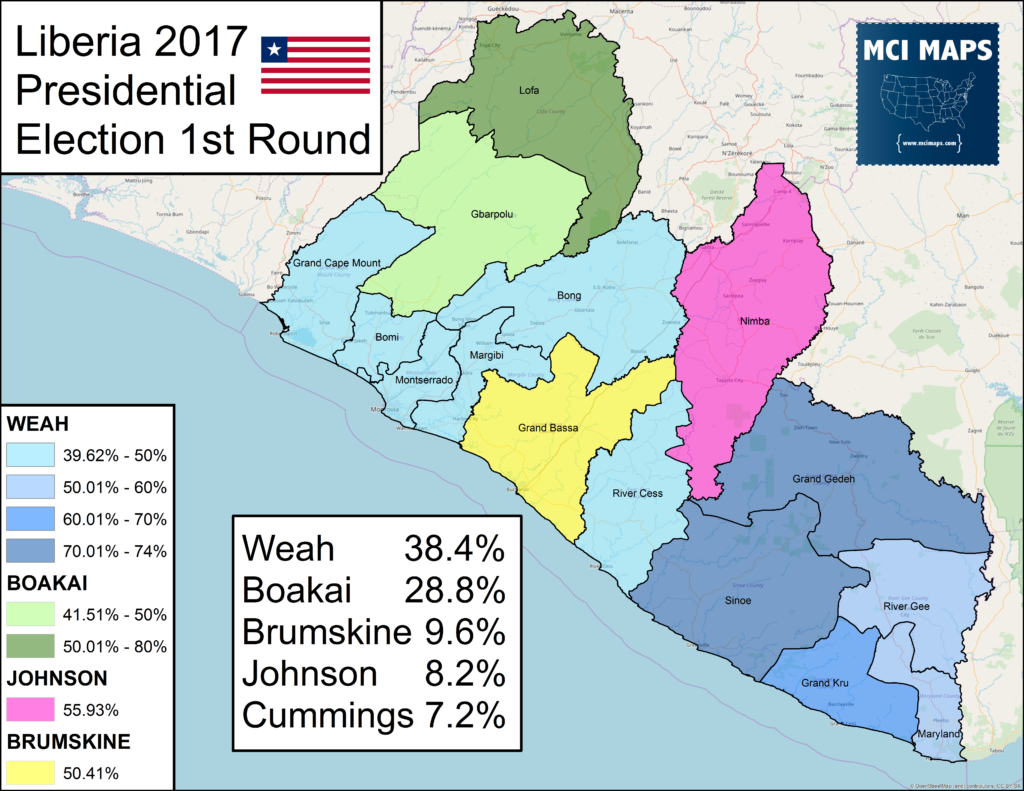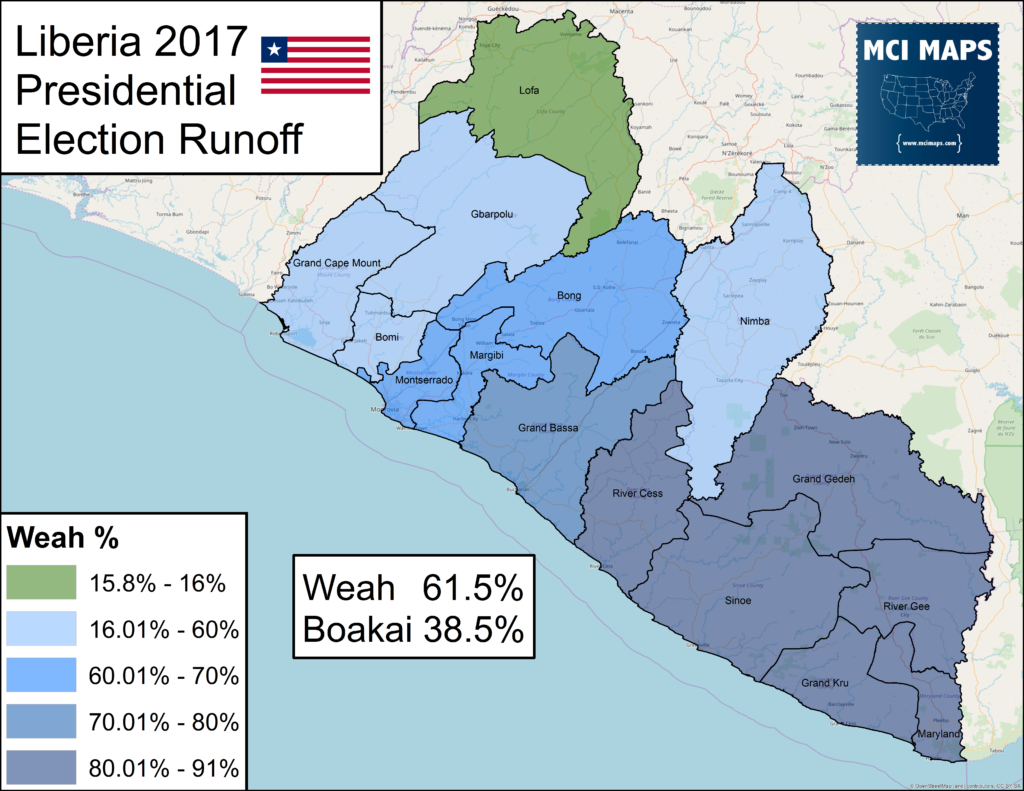Liberia’s 2017 Presidential Election marks the first time in 70 years that a peaceful transition of power has taken place in the nation. Liberia was once a growing and well-functioning state in the post WWII era, but a series of coups and civil wars destroyed the nations prosperity and infrastructure. Nowadays, when most in the west think of Liberia they think of its chaos in the last 3 decades. However, Liberia’s recent elections reflect a shift toward stability. This article takes a look at Liberia’s troubled history as well as the recent elections that have allowed stability to come to the nation.
Liberia’s History and Population
Liberia’s history is chaotic to say the least. Many American students have likely heard about Liberia in the context of mid 19th century America. Liberia was part of the plan of the “American Colonization Society” – a pre-civil war organization that believed the best solution to slavery debate was for emancipated slaves to go back to an African nation set aside for them. The idea divided freedmen in America; most of whom preferred to stay. Ships began landing in Liberia as early as 1822 and the country was formally founded in 1847 with a US-inspired constitution. However, conflict immediately arose with the native population already in the region. The new settlers had better weapons and took control of the region and instituted a quasi-slavery over the natives. This dark twist has shaped Liberia ever since. Tensions between the decedents of settlers and the decedents of native people existed for long time; with decedents of the settlers long ruling the nation.
Liberia is overall a very diverse ethnic nation, however, the ethnic tensions that plague other African Nations aren’t as strong in Liberia. Rather, the tension between native-or-not was for a long time the main divide. Today native decedents are a vast majority of the population, with decendents of the settlers being around 5%. The country is considered over 85% Christian and around 12% Muslim (heavily concentrated in the western border with Sierra Leone). However, indigenous religious practices native to Africa are still practiced much more than they are reported.
Liberia’s population is heavily clustered in the coastal areas. The Capital, Monrovia (named after US President James Monroe) and its home county make up nearly 25% of the population. This map highlights the coastal clustering.
The countries poor infrastructure (weakened in the civil wars) create a scenario were people of different counties (the main administrative units) never interact with each-other.
Liberia’s Golden Age
Liberia fashioned itself a democracy but part of that was in name only by the mid 20th century. Elections occurred through much of the 19th century though I do not have strong data on the nature of these races. What is known if that native Africans were not allowed to vote and had few rights, despite being the majority of the population. William Tubman was elected President in 1944 and served till his death in 1971. He pushed for rights for the native population. Under his rule the country modernized and its economy improved. He was instrumental in getting outside companies to come in for the natural resources. A major raw material in Liberia was was rubber, and this led to the Firestone Tire Company coming into the country to set up rubber plants. The deals between the companies and the Liberian government allowed a good deal of cash to flow into the nation; leading to major infrastructure projects around paving roads and build sanitation systems. This was a positive example of money going to basic needs. It is, of course, no doubt the deals were skewed in favor of companies like Firestone; with corruption a constant issue. However, the mutual relationship with companies in Liberia stand in stark contrast to the much more forced exploitations that took place in other nations and western companies worked to strip nations of their raw materials. Tubman also pushed diversifying the nations exports so it didn’t rely on rubber exports. The country was seen in the 1960s and 1970s as a standout success story in Africa with strong ties to the United States and Europe. This time is referred to as “Liberia’s Golden Age.”
Tubman’s management of the nation is by and large considered a success. However, this washes over his brutal suppression of democracy. Following an assassination attempt other parties were banned and free speech was curtailed. Tubman died in 1971 and his Vice President, William Tolbert, assumed the Presidency.
Tolbert actually did push reforms to return Liberia to a democracy and pushed for an amendment to bare the President from serving more than 8 years. He also pushed for audits on outside companies like Firestone, resulting in millions in unpaid taxes being paid. By no means where these reforms sweeping, but they were a start. However, riots of rising rice prices (a major food staple) led to a coup against Tolbert by Samuel Doe. Tolbert was executed in his bed and his ministers tried in kangaroo courts. Doe was the first native to assume leadership of the nation, but he did so at the barrel of a gun.
Liberia’s Brutal Recent History
While its impossible to know what Liberia’s future would have been, one thing is clear; Doe’s coup set in motion events that would destroy the progress made by Liberia. Doe was inexperienced in running things and opposition to his rule increased with time. He tried to portray himself as a needed change for the large native population. However, he was forced to suppress dissent with brute force. Elections were held in 1985, which Doe won with 50% in a race considered mired with fraud and vote rigging. Doe kept the support of the United States by supporting them in the cold war. Tensions rose as Doe feared coups and rebellions against his rule rose. He brutally put down an attempted coup in Nimba County.
In 1989, Charles Taylor and Prince Johnson, generals who initially had allied with Doe, launched war against him, beginning the First Liberian Civil War. Doe quickly lost control and his only base was in Monrovia. However, Prince Johnson’s forces quickly reached the capital and Doe was executed in 1990. A video on youtube shows Doe being beaten and tortured while Johnson sits and drinks a beer.
While Johnson was the one to kill Doe, Taylor successfully united most of the rebel forces and broke from Johnson. Johnson was forced to flee the nation and Taylor aimed to consolidate support. However, peace did not come. A unity government backed by the country’s neighbors set up in Monrovia while Taylor controlled much of the nation outside the capital. Assorted local warlords also sprung up as any sense of a functioning country collapsed. Taylor made year-long efforts to take the capital… creating years of war. The brutality of the war is hard to describe to full effect… atrocities included
- Mass rape
- Child soldiers
- Murder of civilians
- Cannibalism (often by child soldiers hooked on drugs as part of efforts of generals to dehumanize them)
The war destroyed the nations infrastructure and stability. Over 200,000 people died. An estimated 10-15% of the population of Liberia was killed.
Peace negotiations for all sides finally began around 1995 and 1996. Taylor was unable to take the capital and a stalemate was in effect. An agreement was to stop hostilities and hold elections.
The 1997 “Election”
The 1996 peace accords that ended the 1st Liberian Civil War called for elections as soon as possible. The July 1997 elections were the earliest realistic timetable, and even then more time was probably needed. The country had been decimated by the civil war and its once strong infrastructure was gone. Charles Taylor ran for President and it was widely believed he would resume the war if he was not elected President. Taylor did have fans, who sided with him and saw him as a hero for the removal of Doe from office. However, many simply wanted peace. Taylor ran under a banner of “He Killed my Ma, he Killed my Pa, but I will vote for him.” This slogan sums up the depressing nature of the election. Taylor won the election with 75% of the vote, only falling below 50% (but still winning) in one county.
Montserrado, where Monrovia is located, should highlight the opposition to Taylor that did indeed exist. The city had seen massive destruction during the war. Monrovia had been in Taylor’s targets in the early 1990s as he tried to seize the capital city. Meanwhile, counties like Bong were a Taylor stronghold during the war and Nimba was supportive of Taylor due to their oppression during Doe’s regime. Taylor’s strong showings at the time came from a mixture of support as well as desire for peace. Always remember, when attempting to judge people for their support for men like Taylor… in a county with massive poverty, illiteracy, and disinformation… how anyone might view the events in real time can be far different from how we see it with all the truth easily available.
Taylor’s strongest opponent was future President Ellen Johnson Sirleaf. Sirleaf has been a finance minister under the Tolbert government and survived purges by the Doe regime. She initially supported Taylor’s takeover but came to oppose him in the wake of the war and human right’s abuses.
The election took place under the watch of international observers. It was considered free and fair. However, Taylor’s control of the state radio, allowing the spread of misinformation, and the concern of the resuming of the war, made him a lock to win.
Taylor’s win brought short term piece but the Second Liberian Civil War broke out soon after. Taylor continued to use paramilitary forces to suppress opposition and commit atrocities while President. He was also involved in the Sierra Leone civil war. Eventually, armed rebellion rose against him. Atrocities were committed by both sides but Taylor eventually lost control of the capital. Taylor was subsequently being charged with international crimes for his involvement in the Sierra Leone civil war. In a serious of very complicated events, Taylor was forced from power in 2003 and a caretaker government with UN backing was set up. The US played a major roll in forcing Taylor out, who ceded power to his Vice President. Work by international groups began to prevent takeover by any other armed force and set the country up for proper elections – which would happen in 2005. A nice and neat summary of these events can be found here.
The 2005 Elections
The elections of 2005, monitored by international groups, was largely free and fair. The two strongest candidates were Sirleaf, considered a main element of Taylor opposition, and George Weah, a former soccer (football) star from county. Weah had very enthusiastic support and was seen as the candidate for those tired of the politicians of the country. However, he was dogged by claims he was not experienced to run the country at such a delicate time. Weah’s popularity carried him to 1st place during the first round of voting, with Sirleaf in second.
Weah’s base came from Southern/Eastern Liberia, which is the primary resident of the Kru ethnic group, which both Weah and Sirleaf are members of. Western Liberia will prove to be a major base for Weah through his political career. Sirleaf was strongest around Monrovia and the west.
The runoff saw Sirleaf come from behind to decisively win the election. Weah initially question the results but impartial analysis and investigation showed the vote was fair and Weah conceded.
The election fell with a stark regional split. Weah consolidated his support in the east (except Maryland County) while Sirleaf dominated the west.
2011 Elections
Sirleaf announced her intention to seek a 2nd term in 2011. Her election came just as she was announced to have won the Nobel Piece Prize for her efforts to sustain peace in the country. Sirleaf had support for the stability of the country, but the rampant corruption and poor economy hurt her. The nations infrastructure had been destroyed in the war and the nation was mired in poverty. Liberia ranks around 4th poorest in the world. She managed to win the first round of voting easily, but was below 50%.
This election saw Prince Johnson return to politics and run for President. Johnson has been involved in Liberia politics for several years and had renounced his violent past. He finished third, but took Nimba county. Winston Tubman came in 2nd. Tubman, from Maryland County, was the nephew of the longest serving President Tubman and had worked in many regimes. After Sirleaf came in 1st, Tubman said he would boycott the runoff, citing fraud. Investigations revealed no major fraud. The runoff became a blowout, with Tubman backers staying home and Sirleaf winning 90%.
2017 Elections – Transfer of Power
The 2011 election saw a major event in Liberian politics; the first electoral transfer of power for the nation. Sirleaf was barred from re-election and her vice President, Joseph Boakai, was running under her party banner. George Weah, who almost ran in 2011 and since had been elected to the state senate, announced his campaign. The first round of voting saw Weah come in first and Boakai come in second.
Weah’s support had grown since the last round and he made significant inroads in the eastern counties, including Monrovia. While the nation was stable from the war, the country still struggles with massive poverty and corruption. Weah came to represent change that many voters strongly desired.
One dynamic in this election that must be addressed is the specter of Charles Taylor. Taylor has been in prison for years for his crimes in Sierra Leone but there is a segment of the nation that desires his return. Taylor’s standing is hard to gauge (we don’t have polls) but its stronger than you think. It comes down to a few key points:
- atrocities committed on all sides during the civil make it hard for one side to be seen as villains
- Taylor’s origin going against the unpopular Doe
- Propaganda and misinformation in a nation with little access to impartial sources
- Widespread discontent with government services
- Actions of notorious war figures (former generals) to provide aid to impoverished citizens
Taylor’s standing in Liberia is complicated by all these factors. Taylor backers largely argue the former President’s crimes have been inflated and atrocities were common on all sides and not ordered by him. Taylor still has support in areas like Bong and Nimba county.
Weah actually made Taylor’s ex-wife his running mate for the election and had to deny rumors he’d bring the leader back if elected. To be clear it does’t appear Weah would. However, the VP decision and to hear Weah talk about Taylor, its clear many do not fear painting Taylor with a grey brush. Taylor supporters represent a electoral block of voters that Weah courted for his election.
The runoff was delayed by two months when Brumekine, a evangelical politician, alleged fraud. The Supreme Court put the runoff on hold to investigate but eventually found no issues with the first round of voting. The runoff took place on December 26th, the day after Christmas.
Weah won with overwhelming support, securing 61% of the vote and winning all but one county. Lofa county, the home of Boakai, was the only won to reject Weah. The soccer star crushed opposition in the east and secured strong wins in Monrovia and the west. The large win gives Weah a strong mandate heading into his administration. A big boast to the transfer of power came when Boakai gave his unwavering support to Weah.
Future of Liberia
Liberia was once a shining example of progress in Africa. Unfortunately, military conflict set the country back decades and left it worse off than many of its neighbors. Many who look at Liberia today don’t even know it was once considered a thriving nation; rather it get lumped in as an African nation that never got off the ground. Weah’s pledge in the election was long needed improvements. How well he can deliver remains to be seen. Many structural and institutional blockades stand in his way. The peaceful transfer of power was a positive start. Hopefully peaceful stability remains… as any advancement economically will be impossible otherwise.

